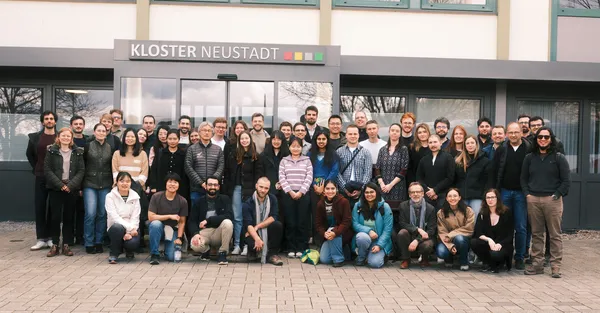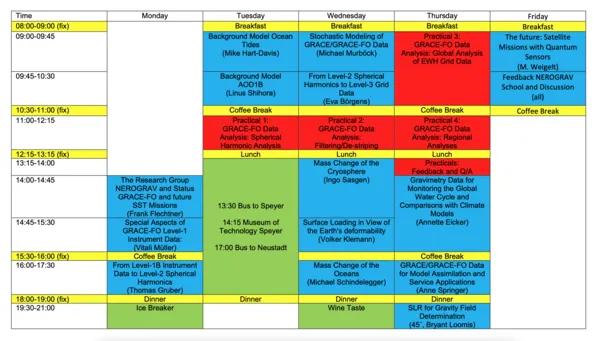
Background
Between 2002 and 2017 the Gravity Recovery and Climate Experiment (GRACE) satellite mission provided a unique 15+ years times series of monthly mass changes of large ice sheets and glaciers, near-surface and underground water storage, the amount of water in large lakes and rivers, or changes in sea level and ocean currents. The observation of mass change provides fundamental indicators of the large-scale climate dynamics and state of our planet, and an integrated global view of how Earth’s water cycle and energy balance are evolving. Since 2018 GRACE Follow-on (GRACE-FO) successfully extends this time series and demonstrates the effectiveness of a tech demo Laser Ranging Interferometer for future gravity missions.
The central hypothesis of the Research Unit NEROGRAV (New Refined Observations of Climate Change from Spaceborne Gravity Missions), funded since 2017 by the German Research Foundation (DFG), reads: Only by concurrently improving and better understanding of sensor data, background models, and processing strategies of satellite gravimetry, the resolution, accuracy, and long-term consistency of mass transport series can be significantly increased, the science return in various fields of application improved and the potential of future technological sensor developments fully exploited.
The spring school educated a group of 37 Ph.D. students and junior scientists in state-of-the-art satellite gravimetry data processing (e.g. spherical harmonic analysis, filtering / de-striping, global / regional analysis of grid data) and applications of mass transport data in Earth system sciences related with the global water cycle, the oceans, or the cryosphere. A look into the future of satellite gravimetry missions completes the program.
Program
Lectures and practicals were given by members of the Research Group NEROGRAV* and other key experts in the topics discussed:
Dr. Eva Börgens (GFZ), Prof. Dr. Annette Eicker (HCU Hamburg), Prof. Dr. Frank Flechtner (TU Berlin), Dr. Thomas Gruber (TU Munich), Dr. Mike Hart-Davis (DGFI-TUM), Dr. Volker Klemann (GFZ), Dr. Bryant Loomis (JPL), Dr. Christian Mielke (U Bonn) Dr. Vitali Müller (AEI), Dr. Michael Murböck (TU Berlin), Dr. Ingo Sasgen (AWI), Prof. Dr. Michael Schindelegger (U Bonn), Marius Schlaak (TUM), Dr. Linus Shihora (GFZ), Dr. Anne Springer (U Bonn), Dr. Roman Sulzbach (GFZ), Prof. Dr. Matthias Weigelt (DLR)
The final program was as follows:
Further information on the location or social program is included in the flyer which can be downloaded here.
Questions
If you have any questions regarding the scientific work in the NEROGRAV research unit, please contact Prof. Dr. Frank Flechtner (frank.flechtner(at)tu-berlin.de).
* This Spring School is organized by the NEROGRAV Research Group (Technische Universität Berlin, Freie Universität Berlin, German Research Centre for Geosciences, Helmholtz Centre Potsdam (GFZ), Universität Bonn, Technische Universität München, HafenCity Universität Hamburg) funded by the German Research Foundation DFG under grant FOR 2736.


